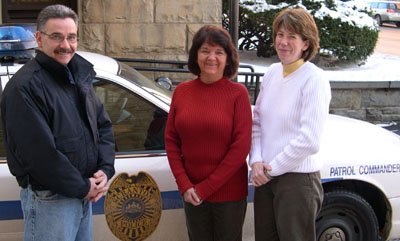|
«
Contents
|

A team effort by Scranton’s unions helped save jobs. From left, Dave
Gervasi, President Fire Fighters Local 60 (IAFF), Anne Marie Stulgis,
Fraternal Order of Police Lodge 2, Nancy Krake, IAM Local 2462.
Scranton,
Pennsylvania faced tough financial times. President Bush’s recession and
the lingering effects of NAFTA caused Scranton to become a distressed
municipality under Pennsylvania’s Municipalities Financial Recovery Act.
The mayor and a
majority of the city council embraced a financial recovery plan pushed
by the Pennsylvania Economy League and signed it in June 2002.
Scranton’s unions were a target of the recovery plan. City-wide layoffs
hit close to half the members of the IAM bargaining unit.
“When I read that recovery plan, I could say I was upset, but that
doesn’t exactly cover it,” said Nancy Krake, a city tax clerk and Local
2462 president. “The potential was there to wipe out the unions.”
The IAM joined two other city unions, the Firefighters and Fraternal
Order of Police, to battle the recovery plan.
“We knew we could rely on each other,” said Krake. “There was a lot of
trust there.” Together, they worked out a way to put the plan on hold by
making it a voter referendum issue. It wasn’t easy.
“We had to fight to get it on the ballot,” said Krake. “We wanted the
community to have the chance to vote.”
And they did. After a trip to court and spending thousands of dollars,
the recovery plan was suspended until the November 2002 election.
False Claims
The mayor and his
allies on the city council claimed that a vote against the recovery plan
would cause massive tax hikes. The city’s two daily newspapers and two
of the three television stations editorialized heavily in the mayor’s
favor.
Voters believed the claims, and approved the plan. So the next step was
to replace the politicians who implemented the plan.
Right on the
Money
“We were approached by council candidates who were disgusted with
the way things were being run in the city,” said Krake.
Leaders from the city’s unions sat down and talked with the candidates.
“They were right on the money,” Krake said.
Once again the city’s unions teamed up and went to work. Union members
drummed up support for the candidates with mailings, email, and
one-on-one visits with voters.
When the dust cleared, two of the pro-union candidates won seats on the
city council. Teamed with a current supportive council member, plan
opponents will form a majority bloc.
“Labor sent a clear message to both Democratic and Republican candidates
in this election,” said District 1 DBR Danny Chmelko. “If you’re not for
working families, you’re out.” |